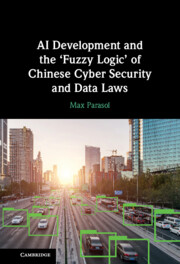Book contents
- AI Development and the ‘Fuzzy Logic’ of Chinese Cyber Security and Data Laws
- AI Development and the ‘Fuzzy Logic’ of Chinese Cyber Security and Data Laws
- Copyright page
- Contents
- Detailed Contents
- Acknowledgements
- Abbreviations
- Introduction
- Part I Historical and Doctrinal Background
- 1 Innovating in China’s Entrepreneurial Ecosystem
- 2 The Extent of Fuzzy Logic
- 3 China’s Cyber Policies
- 4 China’s Data Security Policies Leading to the Cyber Security Law
- 5 The Cyber Security Law
- Part II Impact on Artificial Intelligence
- Conclusion
- Bibliography
- Index
4 - China’s Data Security Policies Leading to the Cyber Security Law
from Part I - Historical and Doctrinal Background
Published online by Cambridge University Press: 16 December 2021
- AI Development and the ‘Fuzzy Logic’ of Chinese Cyber Security and Data Laws
- AI Development and the ‘Fuzzy Logic’ of Chinese Cyber Security and Data Laws
- Copyright page
- Contents
- Detailed Contents
- Acknowledgements
- Abbreviations
- Introduction
- Part I Historical and Doctrinal Background
- 1 Innovating in China’s Entrepreneurial Ecosystem
- 2 The Extent of Fuzzy Logic
- 3 China’s Cyber Policies
- 4 China’s Data Security Policies Leading to the Cyber Security Law
- 5 The Cyber Security Law
- Part II Impact on Artificial Intelligence
- Conclusion
- Bibliography
- Index
Summary
This chapter analyses the policy and regulatory developments leading up to the enactment of the Cyber Security Law, including China’s Anti-Terrorism Law and how enforced source code ‘backdoor provisions’ were removed from the final draft of this law to protect China’s innovation policy goals. The discussion of China’s Network Sovereignty push is continued by explaining the significant debate about Network Sovereignty-related ideological thinking in China’s Anti-Terrorism Law. This law is yet another example of how problematic laws are delayed, as further consultation is sought. Comparisons are also made with a similar policy debate on ‘backdoor provisions’ in the United States, to show that the initial Chinese approach was not so different from universal debates, at that time, and ultimately reflects international practice. Similar approaches are now finding more widespread acceptance globally including in Australia and the United Kingdom.
Keywords
- Type
- Chapter
- Information
- Publisher: Cambridge University PressPrint publication year: 2021

